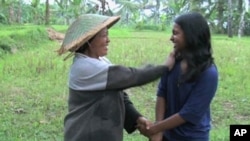As the U.S. Peace Corps celebrates its 50th year of service, the more than 8,000 volunteers currently working in the developing world still adhere to its early vision of service in communities. Volunteers working in one of the agency's newest programs in Indonesia live and work in rural communities, and are forever changed by the experience.
Making a difference
Nisha Skariah, a recent college graduate from Texas, has come to Indonesia both to teach and to learn.
“I mean I am still very young and still trying to make my way in the world and trying to figure out exactly what I want to do," she explained, "and this gives me a little opportunity to focus what I know and what I have done in my life, even with my little experience and make a big change out of that.”
Travis Bluemling from Pennsylvania, who is also teaching English in rural Indonesia, said he wants to make a difference.
“Even if some of these kids can't get to college, learning English and at least having some knowledge of the language can separate themselves from the people next to them when they're looking for a job or meeting people,” he noted.
Bluemling and Skariah, like thousands of Peace Corps volunteers who served before them, are motivated by idealism and a desire to contribute to a better world. What separates the Peace Corps from other U.S. assistance programs is that the volunteers become part of the community where they work. They live with families and make the same wages as other teachers.
Investing in people
|
PEACE CORPS FACTS |
|
About the volunteers
|
John Williams was a volunteer and is now the Peace Corps director in Thailand. He said whether volunteers are working as teachers or in health clinics or with farmers, the personal connections they make are just as important as the technical knowledge they impart.
“The encouragement that they give to a student or a farmer, or a woman in a weaving group, or a person living with AIDS who thinks nobody cares about them," Williams said. "These are the people that Peace Corps volunteers typically work with. Peace Corps volunteers don’t come with a lot of material resources but they come with a lot of heart.”
He said what the United States gets in return for its investment in the Peace Corps is an increased understanding of the world outside its borders.
Surprises
Skariah said she expected that Indonesia, which has the largest Muslim population in the world, would have a more restrictive culture.
“I expected a lot more conservative, maybe a little more, the people and the culture to be a little more restrictive but everyone has been so open and so welcoming and they really embraced me as one of their own," she said. "And I am really grateful for that because it makes me feel like I am at home.”
Bluemling said his family expressed concern about his coming to a country where radical Islamists had targeted Americans in terrorist attacks. The most recent incident was in 2009 when terrorists detonated bombs in the Marriott and Ritz Carlton hotels in Jakarta, killing eight people.
While Bluemling thought he would be safe living in a small village, he expected a level of skepticism or even resentment from community leaders.
“However, I could not have been more wrong. They have allowed me to enter their house," he said. "I joined them in their Muslim meetings. I joined them with fasting and I even entered the mosque.”
Legacy
Peace Corps volunteers have served in many East Asian countries over the years, and now work in China, Thailand, Cambodia, Mongolia and the Philippines, as well as Indonesia.
But the program has run into a few problems over the decades. Volunteers served in Indonesia for a few years in the 1960s, but the Jakarta government asked that the program end in 1965. It only restarted last year.
Peace Corps Timeline













